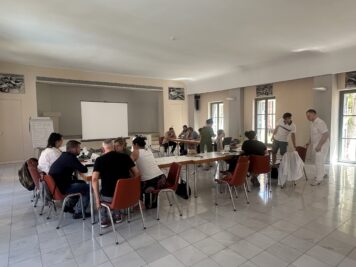A series of workshops across six European countries has brought together diverse stakeholders to tackle one of society’s most pressing challenges: supporting victims of anti-LGBTQI+ hate crimes. The ENACT project (Enhancing the capacity of civil society organizations to support victims of anti-LGBTQI hate crimes) recently completed national workshops in Italy, Spain, Hungary, Greece, Lithuania, and Slovenia, culminating in a transnational gathering in Athens.
The events were grounded in the lived experiences of LGBTQI+ individuals who have faced discrimination and violence. In Slovenia, participants heard testimony from a hate crime victim who is also an asylum seeker, highlighting the intersection of multiple vulnerabilities. In Spain, a bookshop owner shared her experience of targeted attacks and vandalism, while Italian participants engaged in case-based discussions with legal professionals and civil society representatives.
“Participants expressed strong appreciation for the opportunity to meet and exchange with other professionals in the field,” noted the Spanish workshop evaluation, capturing a sentiment echoed across all events.
Bridging the Trust Gap
One of the most significant findings across all workshops was the persistent lack of trust between LGBTQI+ communities and public institutions, particularly law enforcement. Research presented during the events revealed that many victims don’t report hate crimes due to fear of stigma, re-victimization, or being dismissed by authorities.
In Lithuania, the event took place at the Parliamentary Ombudsman’s Office with high-level institutional backing, demonstrating how official support can create safe spaces for dialogue. The event brought together representatives from multiple government ministries, municipal authorities, and law enforcement agencies alongside civil society organizations.
Practical Solutions Emerge
The workshops generated concrete recommendations for improving victim support:
Training and Sensitivity: All countries identified the urgent need for specialized training for law enforcement, legal professionals, and healthcare workers. Hungarian participants specifically noted that not every police officer needs extensive LGBTQI+ training, but comprehensive referral resources should be easily accessible.
Intersectional Approaches: The transnational workshop emphasized how overlapping identities—race, gender, disability, legal status—require tailored support approaches. A case study involving a transgender woman with mobility issues demonstrated how services must adapt to multiple vulnerabilities.
Legal and Institutional Reform: Participants called for stronger hate crime legislation, specialized victim units within courts and police forces, and dedicated compensation funds for survivors.
Innovation in Action
Several innovative practices emerged from the discussions. Spain’s workshop featured presentations on restorative justice programs, offering alternative pathways for healing. Hungary’s session revealed the value of systematic cooperation between civil society organizations and police through working groups, though participants noted that case-by-case local cooperation remains limited.
The Greek workshop demonstrated flexibility in real-time, adjusting its agenda when participants prioritized sharing actual cases over theoretical scenarios—a change that participants valued highly.
“The diverse mix of academic, legal, and operational expertise contributed to a rich and multifaceted discussion,” observed organizers of the transnational workshop, which included researchers, lawyers, criminal law professors, and project managers from across the participating countries.
Looking Forward
The impact of these workshops extends beyond the two-day events themselves. Participants reported gaining new knowledge, building professional networks, and developing concrete plans for implementing changes in their home institutions. In Hungary, organizers are planning a follow-up workshop specifically for public officials who couldn’t attend the original event due to scheduling conflicts.
The transnational workshop concluded with participants outlining specific follow-up actions for their national contexts, from advocacy for legislative reforms to the development of online support services and 24/7 helplines.
As one participant noted, “This is how we create safer communities—one workshop, one connection, one trained professional at a time.” The ENACT workshops have demonstrated that when institutions and communities work together, real change is possible.
The comprehensive portfolio of services and training programme is being developed from these workshops will ensure that the insights and connections made continue to benefit LGBTQI+ hate crime survivors long after the final session has ended.
Co-funded by the European Commission under the Citizens, Equality, Rights and Values Program





